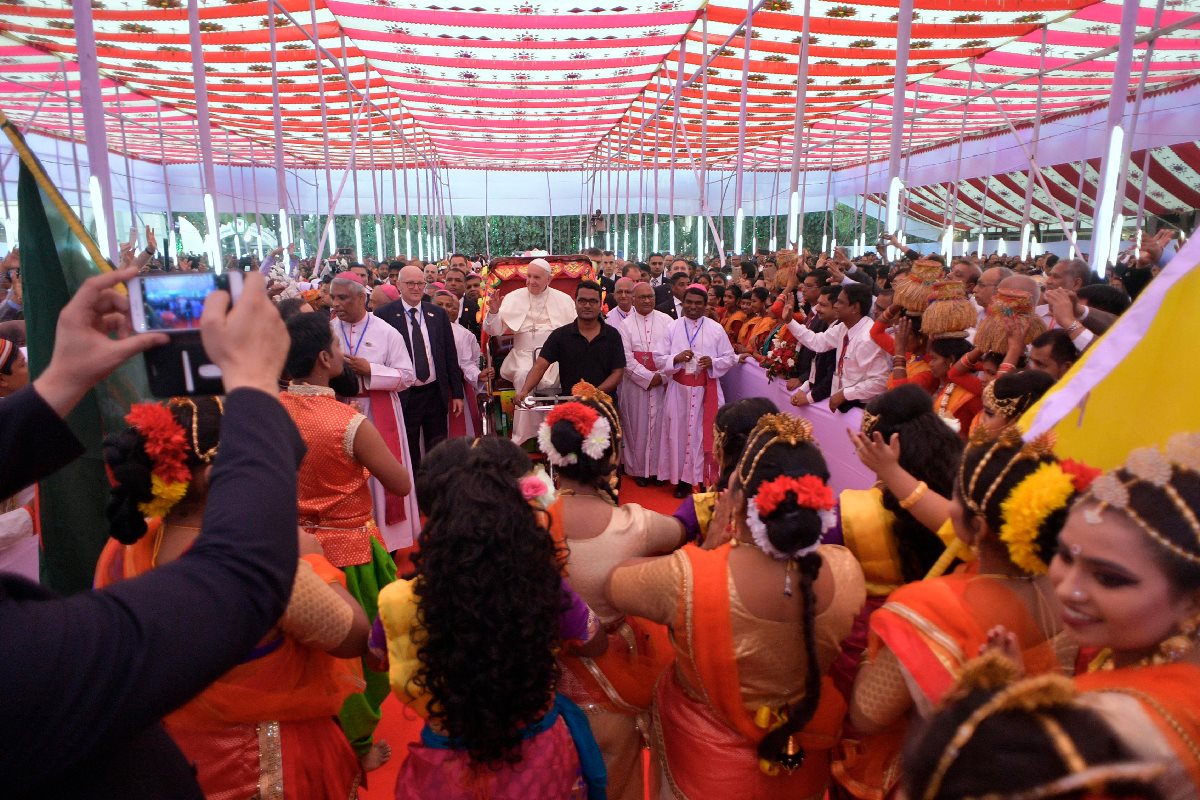He was speaking to the faithful of Bangladesh, but these ideas can apply across the globe, even (especially?) in the West.The Mass celebrated by Pope Francis today in a park in Dhaka, the capital of Bangladesh, had an air of family celebration. First, due to the simplicity of the venue: here, there was only a basic sound system and very few screens reproducing the live video for the crowd: the bare minimum, all that a Church of the poor could afford. As for the stage for the altar, there was no need for an architect; a simple roofed structure did the job.

However, the 100,000 or so faithful in attendance—a third of the country’s Catholics—had not made such an effort for nothing: not only did they see the pope, “their leader,” come to encourage them in their faith, but they were also able to attend the ordination of 16 priests. For Pope Francis, it was the first time he conferred the sacrament of holy orders during any of his 31 voyages in the five years of his pontificate.
This bespeaks the importance the Successor of Peter has given to this major event in the life of the Church in Bangladesh. This is what Father Georges, another Jesuit—this one from Bangladesh—says: “In many parts of the world, vocations are falling… Here, these 16 ordinations are a sign that our little Church is alive!”
There’s no doubt about it: the peripheries of the Church have resources. They might even have some lessons to offer the old Christian communities of the West, who are also tending to become minorities.
Let’s summarize, then, the roadmap offered by the pope to the Catholics of Bangladesh:
- The importance of priests, whose hands offer the sacrifice of Christ. Vocations are “the soul of evangelization,” the pope said once in a message for a congress in Italy on the subject. But during the Mass in Bangladesh, the pontiff also added, specifically for the laity: “Never tire of supporting” the priests with your prayers. “It’s your responsibility!” he said; and do it with a generous heart, he insisted.
- Concern for the active involvement of laity, which is particularly the responsibility of the bishops. It is a question of knowing how to take advice from them, as regards temporal affairs—the management of the finances of the Church, for example. But it is also about supporting all those who exercise an apostolate in the most remote areas of the Church. Today, in Western countries, this means there’s a lot of work to do, in so many areas of professional and daily life…
- A sense of family: This is true for Bangladesh, but it is vital for more individualistic countries such as Western First World countries. The sense of hospitality, of respect for parents and grandparents, for the elderly, the sick… Markers, all of them, of a Christian civilization worthy of the name. Also areas where, according to Pope Francis, we must give an example of the social action of the Church!
- The Church, too, is a big family. Pope Francis gave this wise advice to bishops: strengthen contact between seminarians and elderly priests. In the Church, as well as in society, unity passes through the link between generations. As for the bishops themselves, they must be fathers to their priests: they are “your brothers, your sons and collaborators in the vineyard of the Lord,” the pope said to the bishops.
- Lastly, the essential role of religious life. The Argentine pope knows what he is talking about, having been the provincial superior of the Jesuits in his country of origin. Religious men and women are a sort of “third way” in the Church, the Sovereign Pontiff said. They are not a side track; on the contrary, their contribution to Catholic life is “fundamental.”
Pope Francis’ predecessor, Benedict XVI, once spoke of the role of “creative minorities” to re-evangelize Europe. His successor has just sharpened the outlines of that role.








